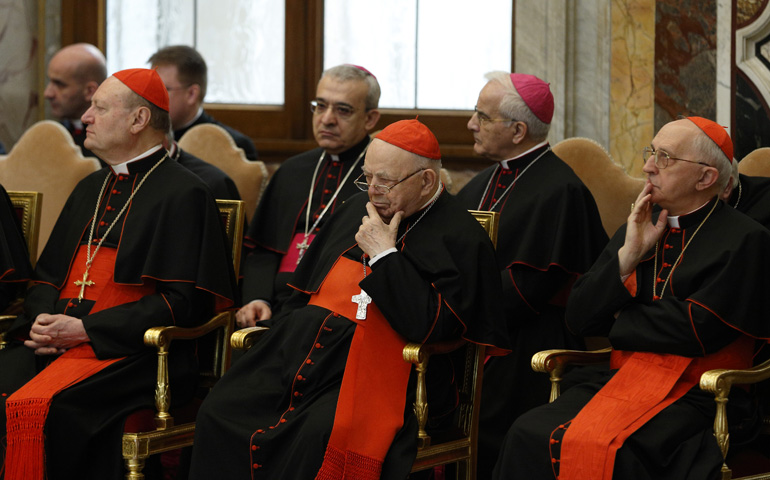
From left: Cardinals Gianfranco, Ravasi, Elio Sgreccia and Fernando Filoni listen to Pope Francis give his Christmas message to members of the Roman Curia on Monday in Clementine Hall at the Vatican. (CNS/Paul Haring)
It's now all but official. Pope Francis and certain members of the Roman Curia's old guard are openly at battle for the soul and future of the Catholic church. And their clash is over a sense of entitlement and privilege traditionally tied to a clericalist ethos and court mentality that has long held sway at the Vatican.
The Argentine pontiff pretty much confirmed that on Monday in his annual pre-Christmas meeting with the Curia's top officials during which he denounced a long list of bad attitudes and behavior he believes are ailing the church's central offices. (Read Joshua J. McElwee's excellent report on the 15 illnesses that, according to Francis, are threatening the Curia's spiritual and moral health.)
The 78-year-old pope delivered his screed to the cardinals and bishops -- that's exactly how many people inside and beyond the walls of the Vatican will read it -- just a little more than 24 hours after France's oldest national paper, Le Figaro, published a cover article in its Sunday magazine titled, "The Secret War Inside the Vatican: How Pope Francis is shaking up the Church."
The conservative paper's highly respected Vatican analyst, Jean-Marie Guénois, claimed in the article that the "climate inside [the Vatican] is not good." He wrote that "fear reigns" among many officials and employees who do not like how the pope is dismantling traditional protocols and who are nervously waiting to see how his eventual structural reforms will affect them. Guénois quoted one of these officials as saying, "His way of governing is disconcerting."
The pre-Christmas speech on Monday is likely to unsettle them even further. Especially certain clerics.
Even though the Jesuit pope did not name names, it's clear he believes some of these cardinals and bishops are inflicted with the "ailments" he listed -- an exaggerated sense of self-importance, lust for power and control, lack of empathy for others, opposition to the movements of the Holy Spirit, careerism, and the "very serious evil" of leading a double life, which he labeled "existential schizophrenia".
The officials, all wearing black cassocks with their red and violet skullcaps and sashes, sat stony-faced throughout the stinging address, which went on for slightly more than 30 minutes. Uncharacteristically, the pope hardly looked up from his written text and made only a couple, very minor unscripted remarks. His delivery was slow and deliberate. The prelates politely, but unenthusiastically applauded at the end.
This was their annual "Christmas party" with the Successor of Peter, but not many of these men looked too jolly or cheerful. Nonetheless, they were all smiles afterward as Francis walked around the room and greeted each of them individually.
In his first pre-Christmas address to the Roman Curia last year, he was similarly critical of clericalism and careerism among Vatican officials. And in this sense, his two meetings up to now have been very different from those held by his most recent predecessors. Previous popes would use the occasion to reflect on events and issues of the last 12 months, delivering what many considered a "State of the Church" address.
But this year, Francis distinguished himself from them even further by doing what none had done before.
After addressing the Curia chieftains in the richly frescoed Clementine Hall inside the Apostolic Palace, he moved over to the much larger and modernly designed Paul VI Hall near his Santa Marta residence. There, he had another pre-Christmas gathering, this time with the rest of the Vatican's workforce and their families. These are the hundreds of mostly laypeople. In the majority of cases, they work as subordinates to the priests, bishops and cardinals that hold the managerial posts.
The pope told them two things in particular that might be viewed as his attempt to bypass a clericalist apparatus, which appears increasingly out of sync with his style and focus, and gain the lay employees' trust and cooperation in his efforts to reform the church's central offices.
First, he made a specific point of praising the Italians who work in the Vatican. This was nothing less than a rebuke to those who have blamed the Italians for the financial and organizational mess that has crippled the Roman Curia for many years. Most recently, the head of the Secretariat of the Economy, Cardinal George Pell, angered Italian workers and officials at the Vatican by bluntly insinuating that they lacked transparency and were oblivious to modern accounting methods.
"It is a fact that the great majority of you are of Italian nationality," the pope told the Vatican employees. "So let me express a particular and, I would say, a necessary thanks to the Italians who, throughout the history of the church and the Roman Curia, have always worked with a generous and faithful spirit."
The pope praised the "unique industriousness and filial devotion" that marked the Italians' work in the Vatican, adding that they have given the church "great saints, popes, martyrs, missionaries and artists." He concluded by saying "no momentary cloud" could "overshadow" all that.
Second, Francis asked the employees to "forgive" him and his "collaborators" for their "shortcomings." He included in this plea for pardon the "great harm" that "scandals" have caused. Of course, laypeople were involved in a number of scandals that have been unveiled inside the Vatican over the years, but when popes refer to their "collaborators," they almost always mean the clerics who assist them.
The full measure of Pope Francis' request for forgiveness can only be gained by reading it in light of a comment he made earlier Monday to the cardinals and bishops.
"I once read that priests are like airplanes: They only make the news when they crash, even if there are many that fly," he said. "How much harm can just one priest that falls do to the whole body of the church."
Some, especially the ordained, may be tempted to interpret the pope's comments as unfairly holding priests to a higher standard than the rest of the baptized. Francis has already earned notoriety among them for picking on priests, being a scold and an anti-clerical moralist. In fact, some have already mocked him for being a populist "pope of the people" who has demoralized and confused those who hold to a more traditionalist view of the "sacred" priesthood.
But his disdain for clericalism and careerism is not aimed only at men in Holy Orders. It is also directed toward women religious and laypeople -- anyone who perpetuates a "clericalist" mentality in which the ordained are treated with privilege and honored as lord-rulers rather and servant-leaders. Such Catholics exist not only at the Vatican, but all throughout the church.
If Francis is trying to bring about a revolution and not just reform in the church-- and some officials, including the head of his Jesuit order, truly believe he is -- then a purge of such a mentality is at the very heart of it. The pope obviously believes that Christmas is a most appropriate time of the year to remind all followers of Christ of this, especially those ordained to serve.
As he told the cardinals and bishops, Christmas "is the appointment with God who is born in the poverty of the grotto of Bethlehem to teach us the power of humility."
[Robert Mickens is editor-in-chief of Global Pulse. Since 1986, he has lived in Rome, where he studied theology at the Pontifical Gregorian University before working 11 years at Vatican Radio and then another decade as correspondent for The Tablet of London.]
Editor's note: We can send you an email alert every time Robert Mickens' column, A Roman Observer, is posted. Go to this page and follow directions: Email alert sign-up.




